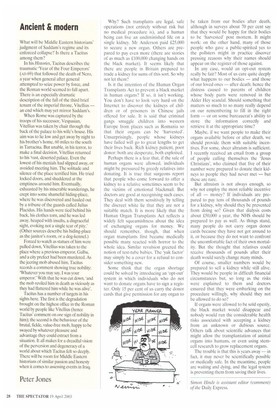Ancient & modern
What will be Middle Eastern historians' judgment of Saddam's regime and its enforced collapse? Is there a Tacitus among them?
In his Histories, Tacitus describes the traumatic 'Year of the Four Emperors' (AD 69) that followed the death of Nero, a year when general after general attempted to seize power by force, and the Roman world seemed to fall apart. There is an especially dramatic description of the fall of the third brief tenant of the imperial throne, Vitellius — an end which may yet mirror Saddam's.
When Rome was captured by the troops of his successor, Vespasian, Vitellius was taken by chair through the back of the palace to his wife's house, His aim was to lie low and get away by night to his brother's home. 60 miles to the south in Tarracina. But unable, in his terror, to make a final decision, Vitellius returned to his 'vast, deserted palace. Even the lowest of his menials had slipped away, or avoided meeting him. The solitude and silence of the place terrified him. He tried locked doors, and shuddered at the emptiness around him. Eventually, exhausted by his miserable wanderings, he crept into some shameful hiding-place, where he was discovered and hauled out by a tribune of the guards called Julius Placidus. His hands were tied behind his back, his clothes torn, and he was led away, heaped with insults, a disgraceful sight, evoking not a single tear of pity.' (Other sources describe his hiding-place as the janitor's room, or a dog-kennel.) Forced to watch as statues of him were pulled down, Vitellius was taken to the place where a previous emperor, Galba, and a city prefect had been murdered. As the jeering mob abused him. Tacitus records a comment showing true nobility: 'Whatever you may say, I was your emperor,' With that he was cut down, 'and the mob reviled him in death as viciously as they had flattered him while he was alive'.
Tacitus has a number of targets in his sights here. The first is the degradation brought on the highest office in the Roman world by people like Vitellius (hence Tacitus' comment on one sign of nobility in him); the second is the behaviour of the brutal, fickle, value-free mob, happy to be swayed by whatever pleasure and advantage they could extract from a situation. It all makes for a dreadful vision of the perversion and degeneracy of a world about which Tacitus felt so deeply. There will be room for Middle Eastern historians of similar passion and honesty when it comes to assessing events in Iraq.
Peter Jones


































































 Previous page
Previous page